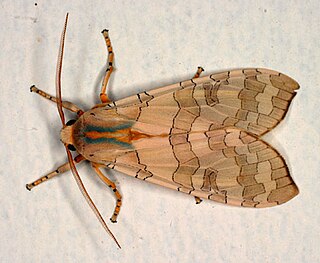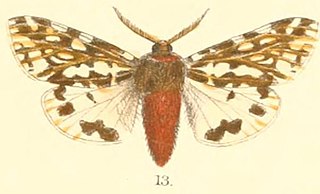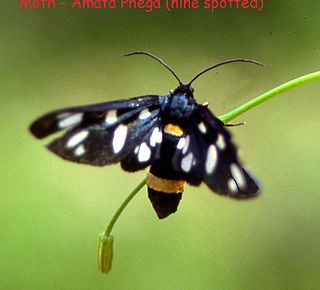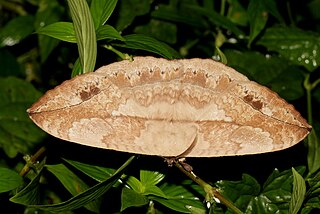
Orgyia is a genus of tussock moths of the family Erebidae. The genus was described by Ochsenheimer in 1810. The species are cosmopolitan, except for the Neotropical realm.

The Thyrididae comprise the family of picture-winged leaf moths. They are the only family in the superfamily Thyridoidea, which sometimes has been included in the Pyraloidea, but this isn't supported by cladistic analysis.

The Lasiocampinae are a subfamily of the moth family Lasiocampidae. The subfamily was described by Thaddeus William Harris in 1841.

Apatelodidae, the American silkworm moths, is a family of insects in the order Lepidoptera. They are a family within the superfamily Bombycoidea.

The Phaegopterina are a subtribe of tiger moths in the tribe Arctiini, which is part of the family Erebidae. The subtribe was described by William Forsell Kirby in 1892.

Eucereon is a genus of tiger moths in the family Erebidae. The genus was erected by Jacob Hübner in 1819.

Lophocampa is a genus of moths in the family Erebidae. The genus was erected by Thaddeus William Harris in 1841. It contains around 75 species.

Metarctia is a genus of moths in the family Erebidae and subfamily Arctiinae. The genus was erected by Francis Walker in 1855.

Alphaea is a genus of tiger moths in the family Erebidae. The genus was erected by Francis Walker in 1855. They are found on India, Sri Lanka, Myanmar and Java only.
Paracles is a genus of moths in the subfamily Arctiinae. The genus was described by Francis Walker in 1855. The species range from Panama to Patagonia, with quite a few in the southern temperate region of South America.

Spilosoma is a genus of moths in the family Erebidae originally described by John Curtis in 1825. A very heterogeneous group, it is in need of review by the scientific community, as certain species probably need reclassification into their own genera.

Pero is a genus of moths in the family Geometridae erected by Gottlieb August Wilhelm Herrich-Schäffer in 1855.
Phiditiidae is a family of moths. The family used to be placed as a subfamily (Phiditiinae) in the family Bombycidae.
Evius cochenouri is a moth of the family Erebidae. It was described by William Schaus in 1910. It is found in Costa Rica.

Evius hippia is a moth of the family Erebidae. It was described by Caspar Stoll in 1790. It is found in Mexico, Panama, Trinidad, French Guiana, Colombia, Suriname, Venezuela and Brazil.
Evius lobata is a moth of the family Erebidae. It was described by Paul Dognin in 1911. It is found in Colombia and French Guiana.

The Syntomini are a tribe of moths in the family Erebidae. The tribe was erected by Gottlieb August Wilhelm Herrich-Schäffer in 1846.

Eupterote is a genus of moths in the family Eupterotidae. It was first described by Jacob Hübner in 1820.
Heterocampinae is a subfamily of prominent moths in the family Notodontidae. There are at least 60 described species of Heterocampinae in North America.













